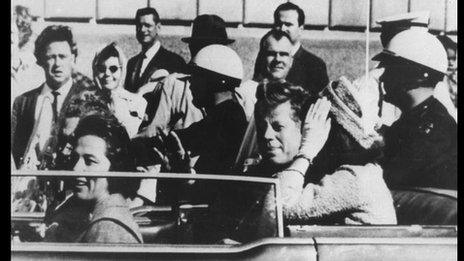Mardell: John F Kennedy's legend endures
- Published
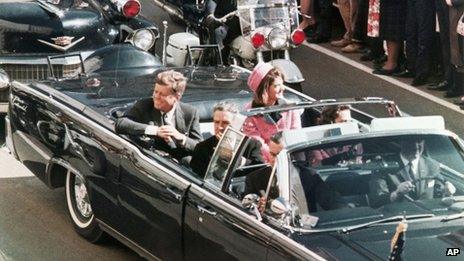
Recent polls rank Kennedy as among the most popular US presidents of modern times, 50 years after his death
Daniel Kendrick takes me to the very spot where he stood 50 years ago, as a 15-year-old schoolboy excited that he was about to catch a glimpse of his president.
What he was actually about to see he could never have imagined.
The Texas Book Depository from where Oswald fired is to our left, the grassy knoll, external beloved of conspiracy theorists just behind us.
But directly in front is the road where the motorcade travelled.
"I was going to rush out to shake his hand but both his fists were up against his neck, he was making gagging sounds, like 'ga ga ga', then his head just exploded," he said.
The city, rather late in the day, is paving over the dip in the road and the white X's that marked where the bullets struck.
Many would love to obliterate the name it earned that day: "City of hate, external".
It can't erase the shock from Mr Kendrick's mind.
'Bullets coming down'
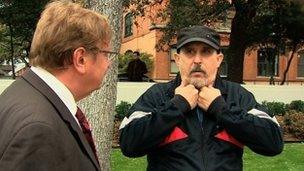
Texas resident Daniel Kendrick remembers witnessing the assassination as a schoolboy
"I saw the look on Jackie Kennedy's face, she turned and looked straight at me with a look of horror on her face," he said. "That really freaked me out. I had to run. I had to go. I had to get out of here."
Mr Kendrick says it was instinct that made him run with a panicked crowd.
"It was really crazy. We lived in the atomic age; I didn't know if it was a prelude to nuclear war. I ran as fast as I could, I was afraid of getting hit. There were bullets coming down," he added. "I'm a Texas boy, Texas boys learn at an early age, if you hear gunplay, run."
We are surrounded by journalists from all over the world, curious tourists snapping away on their phones, and determined men setting up stalls crammed with blurry photos and pages in cramped handwriting, pushing their theories of how and why and who.
But I wonder what Mr Kendrick thinks now of the man he saw murdered.
"He was a visionary. An idealist. A lot of the things he was proposing came to fruition because President Johnson carried on his legacy," he said. "But I wonder sometimes if Kennedy hadn't been shot, would we have had the Civil Rights Act? Would it have made it?"
The very impossibility of answering these and other intriguing historical questions may encourage many to see Kennedy in the mirror of his own optimism.
Recent polls, external indicate that a majority of Americans think that none of the presidents who have followed him have been as good.
The older generation who remember Kennedy the best perhaps look back through a golden haze. Yet JFK's reputation, according to those polls, is even higher with those who are young now.
'Sense of hope'
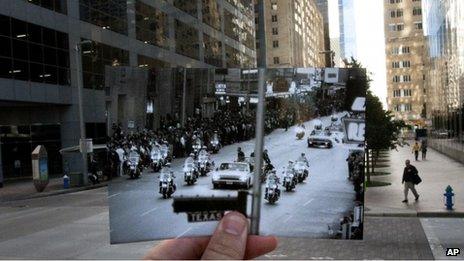
Dallas' Southern Methodist University runs a special programme, external on Kennedy and the way he is remembered. I asked some of the students in the course what they made of him.
One of them, Hunter Pyle, talks of a time that included the Cuban missile crisis, a poor economy and the burning question of civil rights.
"When I started this class Kennedy didn't mean much to me," he said. "Now I see he was hope for our country when many people needed that."
Of course these students know all about his philandering - on such a scale it makes Bill Clinton look like a monk - but that doesn't seem to tarnish his memory or meaning.
Michelle Vogler tells me: "We probably have a much harsher look on him, in the sense we know those flaws, but we look back at him with a sense of hope because his life was cut so short and we memorialise him."
Tyler Friske makes the point that his generation, who suffered the trauma of 9/11 as children, can well understand how America grieved in stunned unity. He seems to think Kennedy has as much meaning now as he did then.
"To me he represents the best of America. In the early 1960s he was an idol to be looked up to, they just loved that aura that surrounded him, and today's youth has that sort of general feeling," he said. "His call to action in that 'ask not, external' speech is as relevant today as it was in the early '60s, especially in the general political climate of the United States today.
"So for me, Kennedy still represents that hope he offered the American people in the '60s."
Sorsha Huff agrees that Kennedy still inspires.
"He encouraged everyone to look past themselves - his emphasis on individualism - and that everyone can make a small difference at least and all of those small differences can add up to so much more," she said. "I think that was a beautiful thing that he did."
'The legend holds'
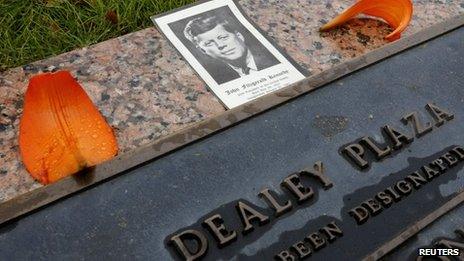
Dealey Plaza, where Kennedy was assassinated, has since been designated a national historic landmark
Their professor Tom Stone thinks their words pinpoint Kennedy's appeal.
"It doesn't matter how much information they get about the guy keeping his bad health a secret, his womanising, his probably authorising assassination plots," he said. "His reputation cannot be damaged - no matter how much reality hits the legend, the legend holds."
He makes the critical point that it is because of Kennedy's early death, because we never saw him wrinkled or fat or frail, that he casts such a long shadow.
"He is forever young in the American mind, forever beautiful and forever full of hope and promise," he said.
"The assassination froze him at that moment. He will always symbolise, even for young people, the unfulfilled promise of America."
- Published19 November 2013
- Published18 November 2013
- Published8 November 2013
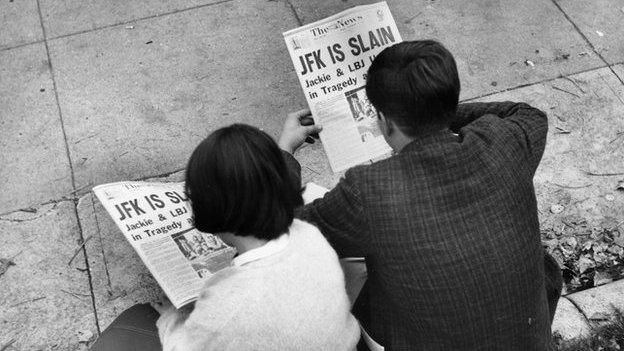
- Published18 October 2013
